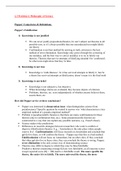2.3 Problem 6: Philosophy of Science
Popper: Conjectures & Refutations
Popper’s Falsification
1) Knowledge is not justified
We can never justify propositions/theories, bc can’t subject our theories to all
possible tests, so it’s always possible that one unconducted test might falsify
our theory
Confirmation is not best method for arriving at truth, criticism is the best
method of error elimination. Knowledge only grows through the correcting of
our mistakes, and the best way to correct mistakes is to try to falsify our
theories. Theories that survive attempts of falsifying shouldn’t be ‘confirmed’,
bc other tests might show that they’re false
2) Knowledge is not true
Knowledge is ‘truth-likeness’, bc it has survived attempts to falsify it. Just bc
a theory has survived attempts at falsification, doesn’t mean it is the final truth
3) Knowledge is not belief
Knowledge is not subjective, but objective
When knowledge claims are evaluated, they become objects of criticism
Problems, theories, etc. exist independently of whether anyone believes them,
asserts them, etc.
How did Popper arrive at these conclusions?
Popper was interested in demarcation issue: what distinguishes science from
pseudoscience? Specific question he wanted to answer was ‘what characterizes a true
empirical method of a pseudo-empirical method?’
Problem w/pseudoscientific theories is that there are many confirmations for these
theories (due to confirmation bias, etc.). Some pseudoscientific theories are
constructed in a way that can explain any possible outcome, e.g., Freud’s theory.
Science makes risky predictions
Differences in research strategies between researchers who want to confirm or
disprove (falsification) theories. E.g., ‘Amsterdam is the only place where people
want to live’. Confirmationists will focus research on Amsterdam and conclude that
ppl do live there, so will confirm the theory – Popper says that this is a bad method.
Falsificationists will not focus on Amsterdam, but on other cities. If they conclude
that other ppl also live in these cities, they can conclude the theory is wrong. Popper:
error elimination is the only correct way of demonstrating science
Theories may differ in degree to which they may be false/falsifiable
Predictive theories (measuring average IQ) are very falsifiable, as all outcome scores
except expected score (IQ = 100) lead to a falsifiable result. The more specific the
theory, the easier it is to falsify. The more universal the theory, the more
, falsifiable it is. “There is a Santa” = not falsifiable, bc we can’t observe all possible
space-time points
Popper also valued severe testing, where we attempt to deduce most improbable
consequences of our theory, check whether these happen. E.g., if you want to falsify
the claim ‘Priests don’t swear’, it’s a more severe test to test them at a golf course
than in church. If we want to test that ‘Treatment x always cures depression’, it’s a
more severe test to treat severe depression rather than easy cases
Popper: there is an inverse between logical probability of a theory & degree of
falsifiability. Tautologies (saying of same thing twice over in different words), e.g.,
‘All brown dogs are brown’ have logical probability of 1 (they are necessarily true),
but zero degree of falsifiability bc they exclude no observable states of affairs
On the other hand, highly falsifiable claims have a low logical probability, bc they
exclude many possible states of affairs, so it’s not logically probable that they will not
be refuted, e.g. ‘All objects near the earth accelerate at 9.8m/s’ is both highly
improbable & highly falsifiable.
Tautologies have no empirical content & highly falsifiable statements have no
empirical content
Science as Problem Solving
Popper: ‘the history of science should be treated not as a history of theories, but as a
history of Problem-Situations’. Problems are the originating source of all scientific
inquiry and theories can only be understood in relation to their Problem-Situations
Good inquiry influences these problems to evolve into different and deeper problems
Growth of knowledge = P1 TS1 EE P2
Initial problem (P1) gives rise to tentative solution (TS), which gives rise to error-
eliminating tests (EE), which gives rise to a new problem (P2). Inquiry begins & ends
with problems
Popper’s view is in contrast with view of logical positivists, in which good scientist is
thought to start with no point of view/interest. Popper rejects view of scientist being
passive. Problems must come before observation & data collection
Scientific problems can arise from philosophical problems. Philosophy can also
provide tentative solutions, although these will be vaguer. Philosophy, however,
differs from science in that the solution can never be falsified, only criticized (bc not
observable)
Deductive reasoning > inductive reasoning
Criticism: deductive reasoning is always true, but it means that science doesn’t come
up with anything new
Paradoxes of induction
1) Lottery paradox
If you have 100 tickets, everyone’s chances of winning is same probability, but only
one person can win.
2) Paradox of Ravens
‘All ravens are black’ vs. ‘all non-black things are not ravens’ but this isn’t true
3) Green-blue paradox
All emeralds before 2100 are green, after they are blue
Criticism: you can only see limited amount of cases





